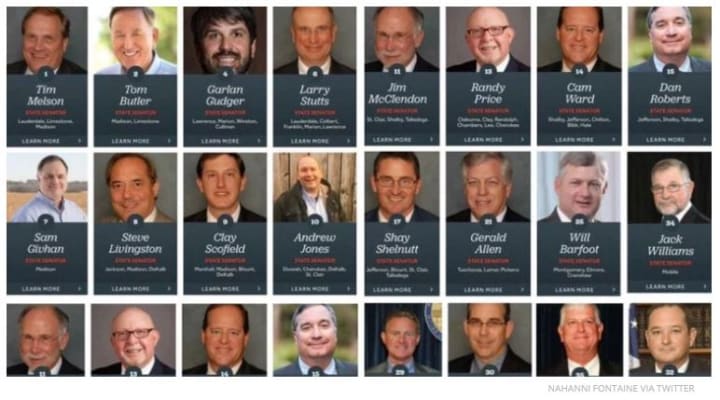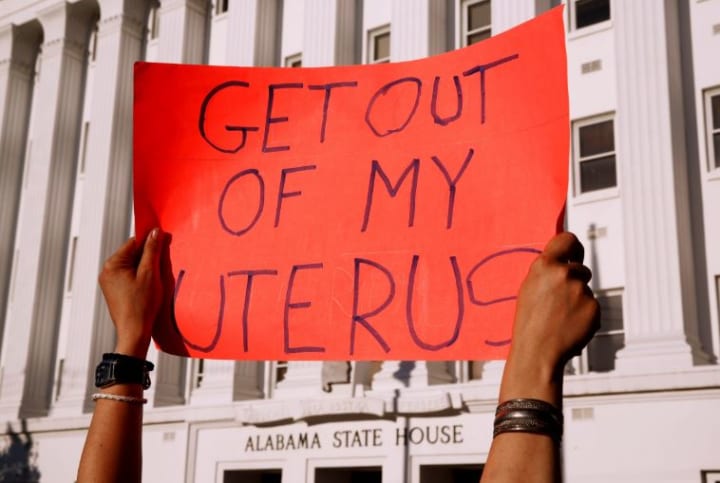
(To warn: content revolves around reproductive rights and abortion.)
Without a doubt, the most recent changes in state legislation pertaining to reproductive rights has sparked massive dialogue on all ends of the political spectrum. Some would say that Alabama and Georgia have infringed on the fourteenth amendment, which states that: "No state shall make or enforce any law which shall abridge the privileges or immunities of citizens of the United States." Others believe that the decisions that state governments of Alabama and Georgia have made a decision that protects religious freedom.
The main reason why these abortion bans have caused such an uproar is because of how drastically different they are from the results of Roe vs. Wade, a class action lawsuit in 1973 in which the Supreme Court ruled that a woman's choice to have an abortion was protected by the fourteenth amendment.
However, while the most recent changes in state legislation due revolve around reproductive rights, I believe that it goes further than that. The abortion bans affect everyone—not just women—on several institutional levels: race, class, healthcare, and gender equality.
Personally, I've been hesitant to enter this conversation because of how unforgiving the dialogue has been. While I am certainly not perfect, I hope that wherever you stand in this conversation, you find peace amid the tension. Be kind to yourself and others and take time if needed. Conversations like this one can be overwhelming. I hope that through healthy conversation we can come to understand each other and come to a middle ground.
Each political choice affects personal life. At the end of the day, we're people trying to fight for what we believe to be true. Whether we stand together or apart, you and I are here as people.
This conversation revolves around the right to life. We cannot forget our humanity.

Image via Pacific Standard.
To begin, let's establish what exactly happened in Alabama and what these changes in legislation indicate.
According to CNN's article ("Fact check: Is the Alabama anti-abortion law likely to go into effect?"), since the 45th president has come into office in 2017, legislation restricting abortion and other reproductive rights have been passed through several other states.
As of Wednesday, May 15, 2019, Alabama joined the group of pro-life states when Governor Kay Ivey signed what is considered one of the most restrictive abortion bans in the country. The reason why the passing of this particular "heartbeat bill" is due to its extreme restrictions.
According to Washington Post's article ("Everything you need to know about the abortion ban news"), Alabama's new "heartbeat bill" bans any abortion over six weeks, which is barely enough time for the person to discover they're pregnant. Along with this, this antiabortion legislation does not make any exceptions—not even for rape or incest, where other states have permitted exceptions. This new bill also makes abortion a felony and physicians who perform the abortion could be charged with up to 99 years of imprisonment.
To put that into proportion: someone who is accused of rape can walk free while a doctor who performs a safe abortion would be in prison for the rest of their life.
While Alabama's most recent heartbeat bill has not yet gone into effect, it is definitely still worth examining due to its implications: the beginning of a movement whose long-term strategy is to overturn Roe v. Wade.
"Okay, so I understand that Alabama's heartbeat bill affects both doctors and women, but earlier you said that this goes beyond reproductive rights. How does race, class, healthcare, and gender equality factor into this?"
Let's start with how race and class issues are affected by bills such as the one Alabama just passed.

Image via Nahanni Fontaine on Twitter.
For the record, every single vote for Alabama's abortion ban came from a white cisgender man that came from a higher income bracket.
This demographic fails to represent those who the ban would disproportionately affect: black and poor women. Targeting the under-resourced is a way to retain power. By systematically forcing black and poor women to become mothers, this bill keeps those it targets within a lower income bracket by forcing them to raise children they can't support.
The goal of these bills isn't just to outlaw abortion: it's a power struggle.
"So I understand that women of color (specifically black women) and poor women are greatly affected by a bill made by a systematically white legislation. How does healthcare factor into all of this?"

Image via The New Yorker.
This is where we find ourselves stepping outside the influence of the Alabama bill and looking at the movement for reproductive justice as a whole.
While I don't wish to generalize, I hope to speak for those involved in the conversation that whether you are #prolife or #prochoice, our goal in pushing for change is to protect the lives of those who have the ability to carry life.
And because of the dissent within and between these groups, I hope we can come to recognize that we all come from diverse backgrounds that cannot be constrained to a simple stereotype or caricature.
That includes those who become pregnant and wish to get an abortion. There is no such thing as a normal circumstance. To generalize the experiences of those who are pregnant is to undermine the situation and the needs of each individual. I hope we can extend empathy and compassion to those who have unplanned pregnancies, whether or not the pregnancy reaches term.
I'm not here to define what life is. Life is too diverse for anyone to constrain to a box. What I wish to speak on is what drives us to continue living.
Those who wish to get an abortion will do whatever they can to obtain an abortion. That's a pattern established by the World Heath Organization, who recorded that there are 25 million unsafe abortions that happen yearly in most developing countries that don't have access to safe healthcare. The antiabortion bans don't stop abortions, but promote unsafe ones.
It's also important to recognize that abortion laws that do expand abortion rights still have restrictions. New York's abortion legislation allows for late-term abortion: which occurs under the circumstance to save the life of womxn because the baby has already been declared dead.
"Womxn? Why don't you just use the term 'women'? Isn't that who these bills are targeted towards, anyways?"

If we are even going to talk about reproductive rights, we need to talk about everyone involved: not just the demographic that's represented.
We need to involve women of color in the conversation: black, Asian, Latinx, indigenous, multiracial. Victims of sexual assault. Undocumented folx. Those who are not neurotypical. Those who are differently abled. Those who belong to lower economic classes. We also need to involve the transgender and gender non-conforming community.
As someone who is Asian and gender non-conforming, it is hard to step into these spaces surrounding reproductive rights because too often we are excluded from the conversation.
Yes, it is vital to include women in the conversation about their bodies. But if we don't include trans* and gender-nonconforming folx, are we really striving for reproductive justice? Your alignment with the LGBT+ community does not determine how bills like the one Alabama passed will effect us.
Whether you stand as someone who is #prolife or #prochoice, before speaking up about this topic I urge you to be aware of all involved and to hold an inclusive space.
If these bills are supposedly made to protect life, but they exclude the voices those already living, then who are these bills really made for?

Via WCPO.com
SOURCES:
Abortion rates by race and ethnicity: https://www.guttmacher.org/infographic/2017/abortion-rates-race-and-ethnicity
Banning Abortions in Cases of Race or Sex Selection or Fetal Anomaly: https://www.guttmacher.org/evidence-you-can-use/banning-abortions-cases-race-or-sex-selection-or-fetal-anomaly
CNN: https://www.cnn.com/2019/05/15/politics/alabama-abortion-bill-fact-check/index.html
(World Health Organization) Preventing an unsafe abortion: https://www.who.int/news-room/fact-sheets/detail/preventing-unsafe-abortion
New York Times: https://www.nytimes.com/2019/05/15/us/alabama-abortion-facts-law-bill.html
more from New York Times: https://www.nytimes.com/2019/05/16/opinion/alabama-abortion-georgia-roe.html
Washington Post: https://www.washingtonpost.com/health/2019/05/17/havent-been-following-abortion-ban-news-heres-everything-you-need-know/?utm_term=.dd8434ed926a
more from Washington Post: https://www.washingtonpost.com/national/alabama-senate-passes-nations-most-restrictive-abortion-law-which-makes-no-exceptions-for-victims-of-rape-and-incest/2019/05/14/e3022376-7665-11e9-b3f5-5673edf2d127_story.html?utm_term=.e3fd7503be40
and one last one from Washington Post: https://www.washingtonpost.com/opinions/abortion-extremism-in-new-york-and-virginia-paved-the-way-for-alabama-and-georgias-laws/2019/05/17/ffad643a-78f0-11e9-bd25-c989555e7766_story.html?utm_term=.81b678a008eb
IMAGE OWNERS:
Pacific Standard: https://psmag.com/news/alabama-is-poised-to-pass-an-outright-ban-on-abortion
Newsweek: https://www.newsweek.com/stephen-colbert-late-show-alabama-anti-abortion-law-1426891
The New Yorker: https://www.newyorker.com/news/news-desk/in-alabama-and-georgia-republicans-move-to-bar-abortion-and-women-look-for-options-while-they-can
WCPO.com: https://www.wcpo.com/news/national/mississippi-imposes-15-week-abortion-ban-nations-toughest
About the Creator
michael o
they | them | theirs
I'm a content creator. Check out my linktree for my art and other publications: https://linktr.ee/inkybattlefields






Comments
There are no comments for this story
Be the first to respond and start the conversation.